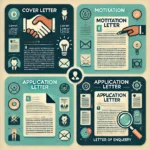Introduction: Navigating the Maze of Job Application Letters
When you’re applying for a job, scholarship, or any formal opportunity, the world of letters can get quite confusing. What exactly is the difference between a cover letter, a motivation letter, an application letter, and a letter of enquiry? Is one more powerful than the other in helping you stand out and land that dream opportunity?
This ultimate guide dives deep into these letter types to uncover their key differences, uses, and best practices, so you can craft the perfect letter for any occasion and boost your chances of success.
Understanding the Types of Letters: A Quick Overview
1. Cover Letter: Your First Impression
A cover letter is a concise letter accompanying your CV when applying for a specific job. It introduces who you are, why you’re interested in the position, and why you’re a strong fit for the role. Essentially, it’s your first pitch to a potential employer.
Key Features of a Cover Letter:

- Purpose: Accompanies a resume or CV for job applications.
- Structure: Short introduction, skills & experience relevant to the job, and a closing statement.
- Tone: Professional yet personable.
- Length: Ideally, one page (around 300-400 words).
Example of a Cover Letter Introduction:
“Dear [Hiring Manager’s Name],
I am writing to express my interest in the Marketing Specialist position advertised on [platform]. With 5 years of experience in digital marketing, coupled with a passion for creativity and analytics, I believe I am the right fit for your team at [Company Name].”
The cover letter should highlight why you’re a match for the role and include specifics that aren’t fully detailed in your CV.
For more on writing effective cover letters, check out How to Write a Compelling Cover Letter for Malawian Job Applications.
2. Motivation Letter: Telling Your Story
A motivation letter, often used in academic or volunteer applications, explains your reasons for wanting to take up a particular position, course, or opportunity. Unlike a cover letter, which focuses more on your professional fit, a motivation letter allows you to share your passion and personal drive.
Key Features of a Motivation Letter:
- Purpose: Used for applications to academic programs, volunteer work, or scholarships.
- Structure: Details your passion, background, and reasons for applying.
- Tone: Inspirational, personal, and driven by your interests.
- Length: One to two pages (around 500-700 words).
Example of a Motivation Letter Snippet:
“Since my teenage years, I have been deeply inspired by the transformative power of education. Having volunteered as a teaching assistant in rural communities, I have seen firsthand the challenges students face without proper resources. This scholarship opportunity at [University Name] will allow me to gain the necessary skills to drive change in education across Malawi.”
The motivation letter is your chance to show your values and why you’re driven to be part of a particular cause, course, or organization.
3. Application Letter: A Formal Request
The application letter (or letter of application) is a more traditional approach to applying for jobs. Unlike a cover letter, which can be more conversational, an application letter is typically more formal. It serves as both an introduction and a detailed explanation of your qualifications, addressing specific criteria in a job posting.
Key Features of an Application Letter:
- Purpose: Direct application for a job, responding to a specific vacancy.
- Structure: More detailed than a cover letter, includes specific examples of qualifications and skills.
- Tone: Formal and detailed.
- Length: One to two pages.
Example of an Application Letter Introduction:
“Dear Sir/Madam,
I am writing to apply for the role of Project Manager as advertised in [Source]. With over 7 years of experience in project coordination and a strong background in strategic planning, I believe my skills align perfectly with the needs of [Company Name].”
Application letters are particularly effective for government, educational, or large corporate positions where detailed applications are necessary.
For a practical example, explore How to Write an Application for Malawi Electoral Commission Vacancies: A Complete Guide.
4. Letter of Enquiry: Making the First Move
The letter of enquiry (or inquiry) is a proactive step to ask about potential job opportunities or positions within an organization that haven’t been advertised. It’s essentially a speculative approach to show interest and make yourself known to the company.
Key Features of a Letter of Enquiry:
- Purpose: To inquire about potential opportunities not publicly advertised.
- Structure: Introduction of self, explanation of interest in the company, and request for potential opportunities.
- Tone: Professional, friendly, and open-ended.
- Length: Brief, one page.
Example of a Letter of Enquiry Opening:
“Dear [Company Name HR],
I am writing to express my interest in joining your innovative team at [Company Name]. As a professional with 3 years of experience in graphic design, I admire the creative work your company produces and would love the opportunity to discuss any current or future openings.”
Letters of enquiry show initiative and are perfect for getting your foot in the door at companies you admire.
Cover Letter vs. Motivation Letter vs. Application Letter vs. Letter of Enquiry: The Key Differences
| Aspect | Cover Letter | Motivation Letter | Application Letter | Letter of Enquiry |
|---|---|---|---|---|
| Purpose | Accompanies job application. | Expresses motivation for courses, programs. | Directly applies for a job with detailed qualifications. | Inquires about possible opportunities. |
| Tone | Professional, tailored to job. | Inspirational, personal. | Formal, addressing job requirements. | Friendly and open-ended. |
| Content Focus | Skills and qualifications for the job. | Passion, drive, and personal story. | Qualifications, alignment with job needs. | Interest in the company, skills offered. |
| Length | 1 page | 1-2 pages | 1-2 pages | 1 page |
Writing Tips for Each Letter Type
For a Winning Cover Letter:
- Personalize It: Tailor your cover letter for the specific role and company.
- Highlight Key Skills: Directly address the qualifications in the job description.
- Be Concise: Stay within a one-page limit for better readability.
For a Compelling Motivation Letter:
- Tell Your Story: Share personal anecdotes that relate to the opportunity.
- Express Passion: Convey your genuine interest and enthusiasm.
- Show Alignment: Clearly explain how the opportunity aligns with your goals.
For a Strong Application Letter:
- Use Formal Language: Keep the tone professional and detailed.
- Address Job Requirements: Tackle each requirement with a clear example.
- Stay Structured: Use paragraphs to organize your experience and qualifications.
For an Effective Letter of Enquiry:
- Do Your Research: Learn about the company culture and mission.
- Be Clear About Your Skills: Let the company know what you bring to the table.
- Follow Up: Show interest by following up on your enquiry.
How Each Letter Works in Real-Life Situations
- Applying for Jobs in Malawi: If you’re exploring job opportunities in Malawi, like Accounting, Finance and Banking Jobs, a cover letter is often your best bet to introduce yourself and your skills.
- Seeking Scholarships: A motivation letter is essential if you’re applying for a scholarship, such as those found on Masters Degree Scholarships.
- Inquiring About Hidden Job Opportunities: If you’re eyeing a specific company but don’t see a vacancy, use a letter of enquiry to open doors that aren’t yet advertised. You can find more on hidden job markets in Navigating Malawi’s Hidden Job Market: Uncover Unadvertised Positions.
FAQs: Answering Your Burning Questions
1. Can I use the same letter template for different applications?
No, it’s important to tailor each letter for the specific role, organization, or opportunity to which you’re applying. Personalization is key!
2. How long should my cover letter be?
A cover letter should ideally be one page, around 300-400 words. Keep it concise and focused on your qualifications for the job.
3. What’s the most important element of a motivation letter?
Your passion and personal drive. A motivation letter should convey your deep interest and how the opportunity aligns with your life goals.
4. When should I send a letter of enquiry?
Send a letter of enquiry if you’re interested in working with a company but don’t see any advertised positions. It’s a great way to demonstrate initiative.
5. How formal should an application letter be?
An application letter should be formal, detailed, and address specific job criteria. It is often longer and more structured than a cover letter.
6. Should I follow up after sending a letter of enquiry?
Yes, following up after a few weeks shows you’re serious and interested. A polite email or call works well.
7. How can I make my cover letter stand out?
Tailor it to the role, use action-oriented language, and directly relate your experience to the job description. A strong opening and closing statement are also crucial.
8. Are cover letters still necessary if I have a detailed resume?
Yes, a cover letter complements your resume by offering context and explaining why you’re the best fit for the role.
9. Is it okay to use a motivation letter for job applications?
Motivation letters are better suited for academic or volunteer applications. For job applications, a cover letter is more appropriate.
10. What tone should I use in a letter of enquiry?
A professional yet friendly tone works best. You want to show genuine interest without being too formal or impersonal.
Conclusion: Craft the Perfect Letter for Every Occasion
In today’s competitive job market, knowing the difference between a cover letter, a motivation letter, an application letter, and a letter of enquiry can make or break your chances of landing an opportunity. Understanding when and how to use each type effectively will showcase your skills, personality, and drive, giving you an edge over other applicants.
If you’re currently on the lookout for job opportunities or need more guidance on letters, be sure to explore Local Jobs in Malawi and International Jobs on Ntchito.com.
Remember, your letter is often your first impression – make it count! Craft it wisely, write passionately, and let your personality shine through. Good luck! ✉️
